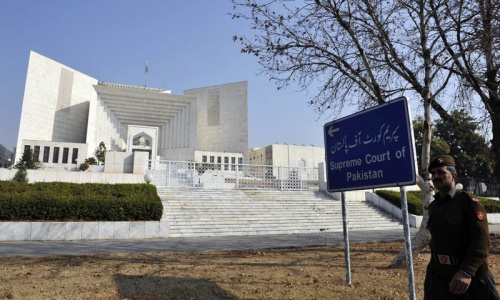ISLAMABAD: The Khyber Pakhtunkhwa government informed the Supreme Court that any Taliban incursion into Pakistani territory from the Afghan province of Nooristan to force the Kalash in Chitral to convert to Islam was almost impossible because the Pakistan Army was regularly patrolling the border.
In reply to a suo motu notice taken by the apex court on Feb 20, KP Advocate General Abdul Latif Yousufzai submitted a two-page report explaining that the army and other law enforcement agencies were regularly keeping a strict vigil through 16 checkposts from Arandu to Lutkoh areas. They were ready to counter any attempt by the Taliban, the report said. Moreover, the border with Nooristan is inaccessible and presently snowbound.
The Malakand commissioner visited Chitral district on Feb 21 and held a meeting with the Kalash community in Bumburet Valley, the report said, adding that the threat issued by the Taliban was nothing new.
The video clip issuing warning to the Kalash to convert to Islam, which was cited by the local and international media, had not been circulated among the people of Chitral, the report claimed.
It said the administration and the army had taken steps to beef up security in the area. On Feb 22, the General Officer Commanding 17 Division, Gen Javed Bukhari, visited the Kalash Valley and reviewed security arrangements, the report said, adding that a unit of the army’s AK-42 regiment had been sent to the area.
Moreover, another platoon of police reached Bumburet; 55 policemen were stationed, in addition to a special force of 15 personnel and an equal number of border police.
“This has boosted the morale of the people of Chitral, particularly Kalash and Ismaili communities,” the report said. It claimed that the news story about the Taliban threat was old and some sections of the media had reproduced it out of “vested interest”.
On Feb 22, the Malakand commissioner met people of the Ismaili community at the governor’s Chitral Cottage in the presence of district administration officials. The community complained about provocative speeches made in a local FM radio channel.
It was revealed that the radio was a religious channel allowed by the Pakistan Electronic Media Regulatory Authority (Pemra). Still the owner of the channel was summoned by the administration to warn him against broadcasting live discussions. It was allowed to air only recorded programmes and that too after screening by the management, the report said.
The action was taken to prevent communal problems in Chitral and promote harmony among different sects and minorities. In case of violation of the agreement, the report added, the administration would request Pemra to cancel the radio licence. It claimed that there was no sectarian issue in Chitral and all communities, including the Kalash and Ismailis, lived in complete harmony.
While taking up the suo motu, the Supreme Court had held that any threat to change faith was against Articles 9 (security of person), 20 (freedom to profess religion and to manage religious institutions) and 36 (protection of minorities) of the Constitution.















































